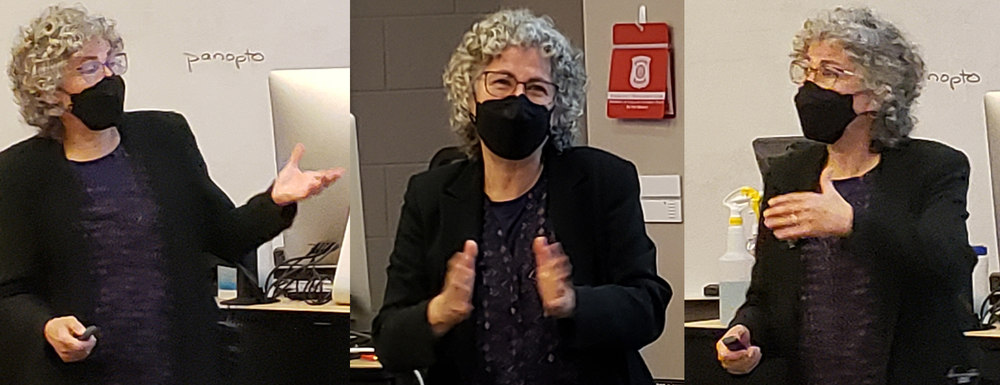
A California-based expert in issues related to asylum seekers at the U.S.-Mexico border spoke at an in-person event on March 17 as part of OUWB’s Global Health Lunch n’ Learn series.
Linda Hill, M.D., a professor in the Department of Family Medicine and Public Health Department of Surgery at the University of California-San Diego School of Medicine, gave a presentation called “Asylum Seeker Program at the US-Mexico Border: A Collaborative Effort of UC San Diego, Jewish Family Services, and Local and State Public Health.”
The Global Health Lunch n’ Learn series aims to help OUWB students, staff, and faculty gain better understanding of global health care by learning about real experiences. This was the first time the series held an event in person since the start of the pandemic.
Hill helps run an asylum seeker program at the border of San Diego and Tijuana in Baja. Her presentation detailed what happened when the program was shut down due to COVID, and what things have looked like since the pandemic.
“We shut down in March 2020,” Hill said during the presentation.
“For that year, the only people that we were able to take through the asylum program were people who were so sick that they were getting humanitarian support to cross the border.”
“We were seeing people who were disabled or who had kids who had cancer, really complicated individuals who were crossing the border, and we were putting them in hotels and then making arrangements for them to get medical care,” Hill added.
Jean Szura, Ph.D., director of Service Learning, described the work that Hill’s involved in as “life-changing.” She said the connection between OUWB and Hill was made through Jason Wasserman, Ph.D., associate professor, Department of Foundational Medical Studies.
Wasserman, she said, described Hill’s program as “incredible” and one that “our students should know about.”
Leah Rotenbakh, M2, also was in attendance and said she was there for the learning experience.
“Dr. Hill took time out of her day to educate us on this program and to learn about all this incredible work they're doing,” Rotenbakh said. “It was very important to learn about it. I really wanted to hear what's actually going on from somebody that's there. It was very inspiring.”
Rotenbakh also wanted to find out how medical students could get involved.
Rotenbakh said she was very inspired by the presentation, adding that it served as a reality check.
| More from OUWB |
“I saw the importance of social work, public health and medicine coming together,” Rotenbakh said. “I saw how many different organizations have to work together to help these people. So, I think that was something I really got out of it…what's going on in this world and what's going on in California, San Diego…the things that people are going through and how it's just awareness and it's important for our future as physicians to be a part of the public health world.”
“You hear so much, and always the second part is what can we do about it?” Rotenbakh said. “And I think this was a good opportunity to hear about away rotation opportunities and what we can do to help.”
Rose Wedemeyer, Ph.D., director of Education Training, who was in attendance and had been to one of Hill’s sessions prior to this Lunch n’ Learn, “really admired her presentation.”
“The way that she shares data that we hear about in the news every day … she really brings it to life, not just with the images that she shares but with the stories of real people,” Wedemeyer said,
Wedemeyer added that the work Hill does is inspirational.
“I was very appreciative to hear what has happened since COVID,” Wedemeyer said. “Because … it does make me wonder, what can we do to help? What can our students do to help?”
To request an interview, visit the OUWB Communications & Marketing webpage.
NOTICE: Except where otherwise noted, all articles are published under a Creative Commons Attribution 3.0 license. You are free to copy, distribute, adapt, transmit, or make commercial use of this work as long as you attribute Oakland University William Beaumont School of Medicine as the original creator and include a link to this article.

